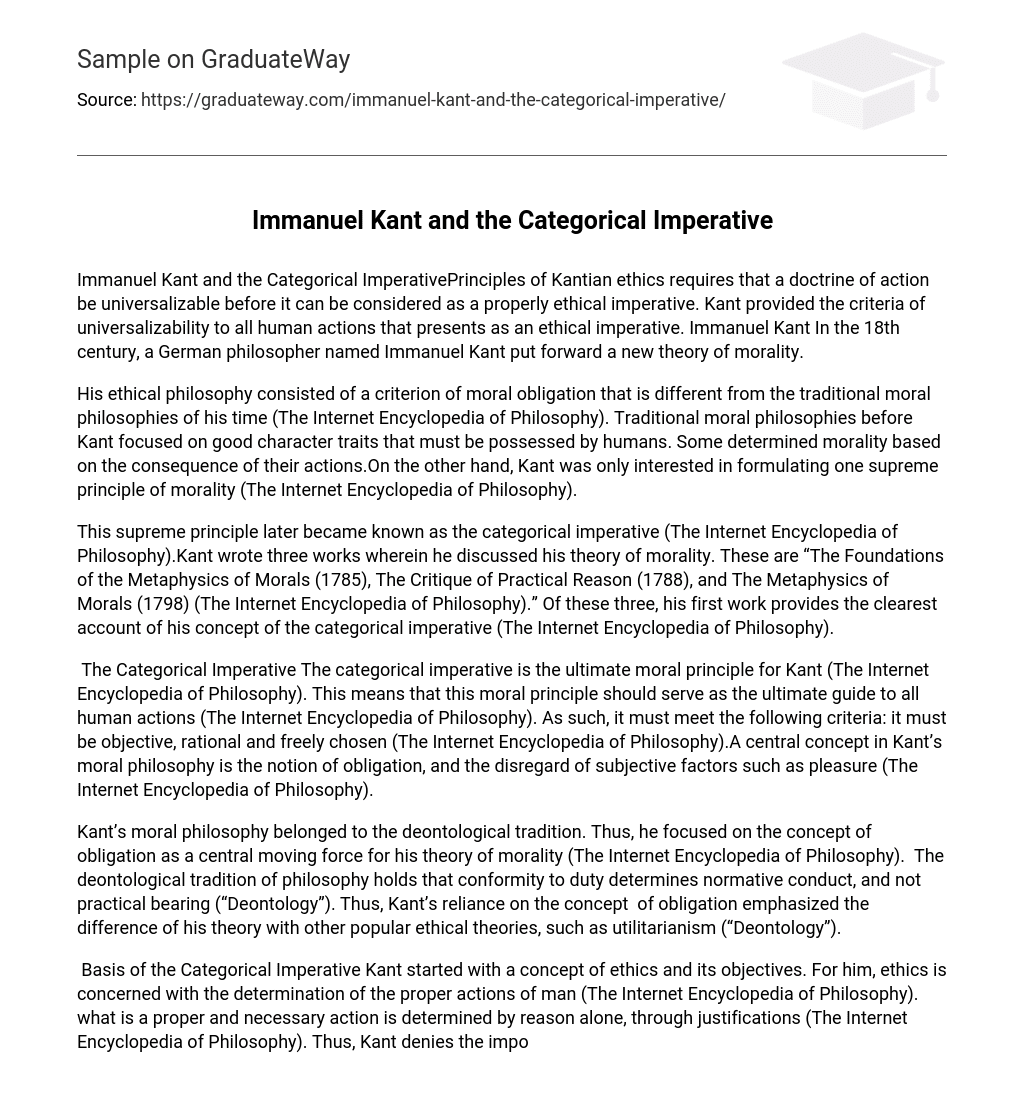Immanuel Kant and the Categorical ImperativePrinciples of Kantian ethics requires that a doctrine of action be universalizable before it can be considered as a properly ethical imperative. Kant provided the criteria of universalizability to all human actions that presents as an ethical imperative. Immanuel Kant In the 18th century, a German philosopher named Immanuel Kant put forward a new theory of morality.
His ethical philosophy consisted of a criterion of moral obligation that is different from the traditional moral philosophies of his time (The Internet Encyclopedia of Philosophy). Traditional moral philosophies before Kant focused on good character traits that must be possessed by humans. Some determined morality based on the consequence of their actions.On the other hand, Kant was only interested in formulating one supreme principle of morality (The Internet Encyclopedia of Philosophy).
This supreme principle later became known as the categorical imperative (The Internet Encyclopedia of Philosophy).Kant wrote three works wherein he discussed his theory of morality. These are “The Foundations of the Metaphysics of Morals (1785), The Critique of Practical Reason (1788), and The Metaphysics of Morals (1798) (The Internet Encyclopedia of Philosophy).” Of these three, his first work provides the clearest account of his concept of the categorical imperative (The Internet Encyclopedia of Philosophy).
The Categorical Imperative The categorical imperative is the ultimate moral principle for Kant (The Internet Encyclopedia of Philosophy). This means that this moral principle should serve as the ultimate guide to all human actions (The Internet Encyclopedia of Philosophy). As such, it must meet the following criteria: it must be objective, rational and freely chosen (The Internet Encyclopedia of Philosophy).A central concept in Kant’s moral philosophy is the notion of obligation, and the disregard of subjective factors such as pleasure (The Internet Encyclopedia of Philosophy).
Kant’s moral philosophy belonged to the deontological tradition. Thus, he focused on the concept of obligation as a central moving force for his theory of morality (The Internet Encyclopedia of Philosophy). The deontological tradition of philosophy holds that conformity to duty determines normative conduct, and not practical bearing (“Deontology”). Thus, Kant’s reliance on the concept of obligation emphasized the difference of his theory with other popular ethical theories, such as utilitarianism (“Deontology”).
Basis of the Categorical Imperative Kant started with a concept of ethics and its objectives. For him, ethics is concerned with the determination of the proper actions of man (The Internet Encyclopedia of Philosophy). what is a proper and necessary action is determined by reason alone, through justifications (The Internet Encyclopedia of Philosophy). Thus, Kant denies the importance or necessity of considering subjective factors such as emotions in determining the proper action in ay given circumstance (The Internet Encyclopedia of Philosophy).
Kant based his concept of categorical imperative on notions of obligation, necessity and reason (The Internet Encyclopedia of Philosophy). Thus, he formulated the categorical imperative as an absolute rule of conduct. The categorical imperative was formulated, thus:“So act, that the rule on which thou actest would admit of being adopted as a law by all rational beings. (Kant).
”The above formulation can be attributed to Kant’s conviction in the belief that human will is supreme. This does not mean that Kant did not accept the possible influences of various internal and external factors, but he believes that reason would always teach man how to deal with such influences and act in the proper manner. The Universalizability Principle The standard of moral obligation is met with the completion of three essential elements (The Internet Encyclopedia of Philosophy). First, there must exist a single principle of obligation.
Pursuant to the deontological tradition, this obligation would serve as the rational consideration for the human will (The Internet Encyclopedia of Philosophy). Second, the obligation must be expressed in the form of a command that orders a specific course of action (The Internet Encyclopedia of Philosophy). Finally, the standard should not be based on consequences of the act. Again it should be noted that Kant did not favor relying on irrational bases for human actions, such as the consequences of such actions (The Internet Encyclopedia of Philosophy).
The principle of universalizability formulated by Kant is as follows:“So act, that the rule on which thou actest would admit of being adopted as a law by all rational beings (Kant).” The universalizabliity formula means that an action can only be considered an ethical imperative if his desired action could be formulated as a general rule for all humans facing similar circumstances in the future (Kant). Failure to pass this criterion would be detrimental to an action’s being considered an ethical imperative.Kant formulated the principle of universalizability to serve as a “practical method for evaluating particular human actions of several distinct varieties (Kemerling).
” Kant wanted that each person applying the principle must think of himself as an agent in the determination of a general rule. He should be conscious that such rule must be followed in all similar situations in the future (Kemerling). Thus, the possibility of an action ripening into a general rule of humanity places responsibility and accountability on all humans before adopting a specific course of action (Kemerling). Works Cited“Deontology.
” Tiscali Encyclopaedia. 2006. 17 Oct. 2007 <http://www.
tiscali.co.uk/reference/encyclopaedia/hutchinson/m0023766.html>.
Kant, I. “The Foundations of the Metaphysics of Morals.” 1785. Kemerling, G.
“Kant: The Moral Order.” 2001. 17 Oct. 2007 <http://www.
philosophypages.com/hy/5i.htm>. The Internet Encyclopedia of Philosophy.
“The Categorical Imperative.” 2001. 17 Oct. 2007 <http://www.nd.edu/~rbarger/categorical-imperative.html>.





